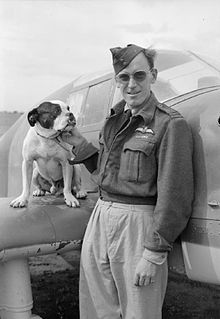W. G. G. Duncan Smith
| W. G. G. Duncan Smith | |
|---|---|

Wing Commander Smith with "Bonzo", an RAF squadron bulldog mascot in Italy, 1943
|
|
| Nickname(s) | Smithy |
| Born |
28 May 1914 Madras, Madras Presidency, India |
| Died | 11 December 1996 (aged 82) |
| Allegiance | United Kingdom |
| Service/branch | Royal Air Force |
| Years of service | 1936–1960 |
| Rank | Group Captain |
| Service number | 85684 |
| Commands held | No. 64 Squadron RAF |
| Battles/wars |
Second World War Malayan Emergency |
| Awards |
Distinguished Service Order & Bar Distinguished Flying Cross & Two Bars Air Efficiency Award |
| Relations | Iain Duncan Smith (son) |
Group Captain Wilfrid George Gerald Duncan Smith, DSO & Bar, DFC & Two Bars, AE (28 May 1914 – 11 December 1996) was a Royal Air Force flying ace of the Second World War. He is the father of Iain Duncan Smith, the former Leader of the Conservative Party.
Duncan Smith was born in Madras, India (now Chennai) on 28 May 1914, the son of a Mysore Post Office Superintendent, Wilfrid Arthur Smith and Anna Cecilia Smith (née Duncan). He was educated at Nairn and Morrison's Academy, Crieff, in Scotland, where he joined his school's Officers' Training Corps. Returning to India in 1933, he became a coffee and tea planter, but in 1936 returned to the UK as a mechanical engineer, and then as a salesman for Great Western Motors in Reading. With war looming he joined the Royal Air Force Volunteer Reserve (RAFVR).
A sergeant at the start of the Second World War, Duncan Smith was commissioned as a pilot officer (on probation) on 29 September 1940. Serving with No. 7 Operational Training Unit at the outbreak of war, Smith was posted to the Spitfire-equipped No. 611 Squadron RAF at RAF Hornchurch in October 1940. He was awarded a Distinguished Flying Cross (DFC) in June 1941, and went to No. 603 Squadron RAF in August 1941 as a Flight Commander. Smith was due for a rest but had to remain operational, leading his squadron while bringing their new squadron leader up to speed. He was promoted to flying officer (war-substantive) on 29 September. On 20 November he was taken ill, passing out after returning from a convoy patrol. Smith spent some time in hospital with double pneumonia, the symptoms of which he had assumed was only the result of exhaustion from a long operational tour.
...
Wikipedia
